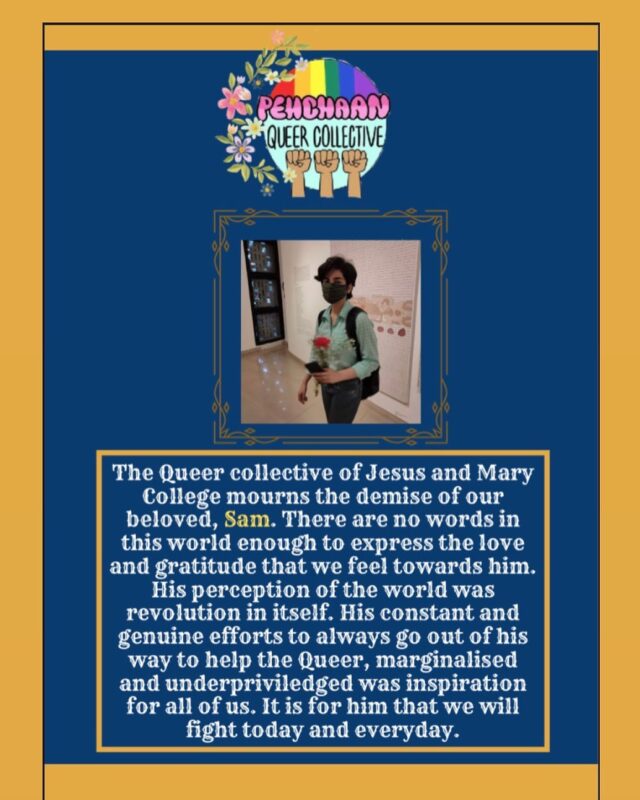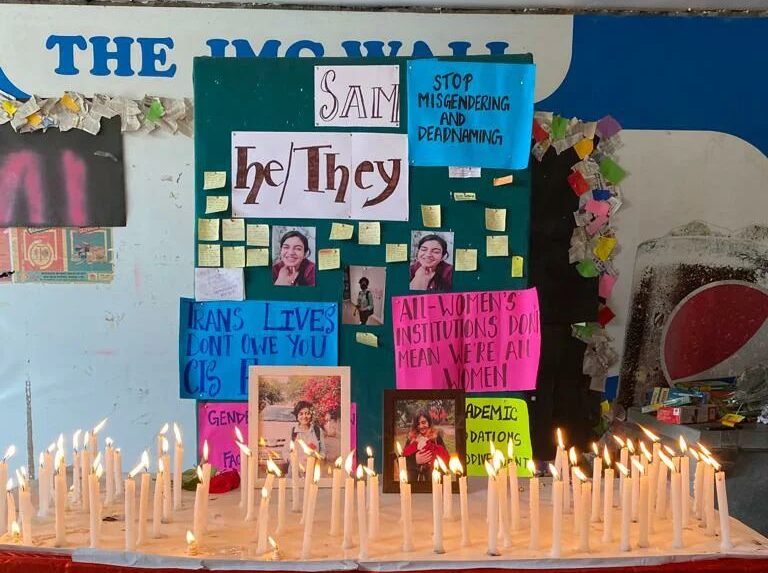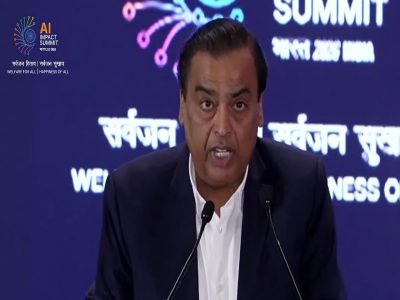“I Realize in the Midst of a Health Pandemic that I am Young and Deserve a Non-Apocalyptic World.”
This was the title of a poem by Sam. It echoes the sentiment of many young people who found themselves stuck in the four walls of their neurotypical, heterosexual ‘home’ when the first lockdown was imposed in March 2020.
Sam, a student of Jesus and Mary College of Delhi University, went by a different name on papers before he came out to people, in the absence of any provision to officially transition. He was trans, neuroqueer, self-reliant, and barely 20. He passed away on 5 April, with the circumstances around his death remaining unclear for now.
Claims of neglect and Institutional Murder
In his poem, Sam wrote: I only just began kissing / the corners of the city calling out to me / i have not longed for my room yet / i still starve myself. / i have still not realised that self-love takes a revolution / i have not sat at tables yet / that i felt i deserved to be at / i have never voted. / i deserve more for someone who was never given the chance to better herself / self-actualisation comes after procurement of a safe home.
These bold lines vividly speak for the troubles that young queer people have always talked about through protests, conversations, art and other mediums. Clearly, his death is not only a setback for the queer community but a loss for society at large.
Peers have called Sam’s demise an ‘institutional murder’, a term earlier used in the case of Rohith Vemulla, Payal Tadvi and some other students, who lost their lives while studying or working in an institution.
ALSO READ: No home for India’s queer: networks of support and collective living their only respite
A 2019 report by the Economic and Political Weekly (EPW) explains it as “power structures (that) allow for the creation and perpetuation of the kind of thought and environment that can corrode human behaviour.” It implies institutionally or systemically imposed neglect of those belonging to marginalised backgrounds, ultimately leading to their death.
In his case, being neuro-queer added to his struggles of daily life. According to Anjan Joshi, founder of Delhi-based Society for People’s Awareness, Care and Empowerment (SPACE), “It is a clinical term rather than a social or cultural term at the intersection of gender, sexuality and cognitive issues, and its implications vary from person to person.”

A will to save others
Sam considered his friend circle his family, for they gave him a supportive space that enabled him to fulfil his vision of helping the queer community in India.
He brimmed with ideas and passion for building a queer-friendly space in a traditional all-women institution right from the first year of his course at JMC.
During the pandemic, several young people from the queer community began to flee abusive households and families. They found themselves stuck in limbo due to unfinished school education, college degrees, unemployment or prejudices that forced them to seek funds and queer resources. For them, Sam established a fundraising space called ‘Save The Gaybies’.
A friend of Sam says, “He would always just send in his money whenever anyone needed it, even if he didn’t have it for himself.”
“His last message to me on 3 April was to confirm my presence for the study circle he was hosting on Thursday”, a friend writes on an instagram post. He stood passionately for the cause of the often-closeted queer community in college spaces and in general.
What’s next?
“In the loving memory of our dear Sam, join the Queer Collective of Jesus and Mary College for the memorial of our most cherished Sam,” read a poster that was shared in the online space after a public notice about his death was shared on 9 April on Pehchaan QC’s Instagram.
The QC had a memorial service for the students and faculty members of JMC where a conversation on the larger social and political situation around the trans, neuro-divergent and queer community took place and the need to have safer campuses was recognised.
“All Women’s institution does not mean we’re all women,” read one hand-made poster at the memorial service. Another one read: “Stop mis-gendering and dead naming”.
ALSO READ: A tryst with queerness: womanhood and queerness in the capital
Demands for queer-affirmative action within an all-female space have been at the centre at the college in the past few years. These demands include gender sensitisation for the student body and the faculty members, and academic accommodation for the neuro-divergent students within the college.
DU student bodies like AISA have also repeatedly emphasised on the formation of Gender Sensitisation Committee Against Sexual Harassment (GSCASH), and on making all colleges of University of Delhi (DU) more inclusive for its queer students.
Many grieving friends and acquaintances of Sam from outside his college had a separate memorial service. A web meet was separately organised soon after for those who could not attend the service.
Patriot was in touch with Sam until the last week of February to write about his fundraising platform and his contribution to the community so far.
He was actively engaged for as long as anyone could have, before we had to put a halt on the report in the last week of February due to reasons concerning his well-being.
His death is yet another insufferable and silent loss to the queer community. It is a call for urgent action unconditionally. Sam would have turned 21 on 17 April this year.
For more stories that cover the ongoings of Delhi NCR, follow us on:
Instagram: https://www.instagram.com/thepatriot_in/
Twitter: https://twitter.com/Patriot_Delhi
Facebook: https://www.facebook.com/Thepatriotnewsindia





